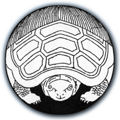
I had a disconcerting experience the other day while reading a book. I wanted to recall something the author had written several chapters earlier, and I experienced a shuddering jolt of cognitive dissonance when my mind reached for the global search function and almost simultaneously realized that no, this was a book, with pages. It struck me as wrong, somehow, that the only way to find the reference I needed was to flip through pages.
And there was another incident, during a conversation, when I needed a fact about something--the scientific name for a banana slug’s blow hole (the pneumostome), or the previous role of a supporting actor in a TV show I was watching (Justin Kirk in Weeds and Angels in America)--and for a brief and jarring moment, my mind actually mistook itself for Google. The question arose, initiating the search, and then…nothing. My mind just hung there, like a frozen drive, or a system crash, spinning like the pizza of death.
No wonder I feel stupid all the time. (I remembered pseumostome, but I had to Google Weeds to find Justin Kirk.)
I’ve been worried about my memory ever since my mom was diagnosed with Alzheimer’s, but it’s quite possible that the lapses I experience are not lapses at all, but rather phantom gaps created by the very technology that was invented to fill them. There’s an article in my De.li.cious feed from the Journal of Higher Education, called The End of Solitude, which talks about this phenomenon, how technology creates the problems that it’s designed to solve. Thus, television creates boredom by alleviating it, eroding the skills we need to entertain ourselves. The Internet creates loneliness by enabling constant connectivity with our social networks, thereby defamiliarizing solitude and turning it into something to fear and avoid, rather than to savor.
I think something analogous is going on with my experience of the way my mind conceives of memory and information. My cyborg mind has melded with these digital interfaces and become so conditioned by access to these certain types of information, that it now compares itself to Google and Wikipedia, and finds itself continually wanting.
So, it will be interesting to see if my experience of my mind changes, and if the conditioning can be reversed. This monastic retreat is an experiment, one I’ve always wanted to perform on myself, and right now I’m caught between leaving and going. It is an unsettling time, and I’m enjoying it.
